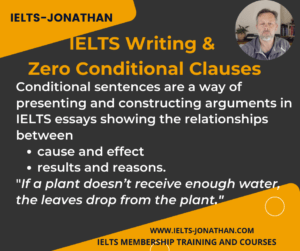Why conditional sentences are important in IELTS
Understanding and using conditional sentences will make your language more ‘complex’ and will allow you to talk and write about more complicated ideas.
As you understand the possible meanings and functions of conditional sentences, it will also help your understanding in the IELTS reading and listening test.
In this lesson, we will go through the basic meaning and grammatical construction of Zero Conditionals with examples and a chance to practice what you know.
The good news is that although learning the concept of English conditionals might not always be easy, once you have mastered it, it is not easily forgotten. 🙂
Conditionals – The Basics
Conditional sentences are always made up of two parts or two clauses; these are just different names for the same thing.
There is always a condition and a result.
If the earth lacked an atmosphere, life would never have developed.
Here’s an example:
If + clause (condition) + clause (result)
or
Clause (result) + if + clause (condition)
The basic use of the zero conditional
The zero conditional is useful to describe things which are true or are more than likely to happen and is often thought of as a ‘real conditional’.
Example:
If water drops to 0 ℃ or 32 ℉, it freezes.
If light passes through raindrops, then a rainbow is formed.
If water reaches 100 ℃, it starts to produce steam.
Both clauses in the zero conditional typically use present tense verbs to express the condition and the result which is true or always produces the same result.
How the zero conditional is formed
Zero conditional sentences are mostly commonly formed in this way using the present tense:
IF + Condition + Result
If + clause (Present Simple – Condition) + clause (Present Simple – Result)
If rain passes through cold air, snow or hail forms.
You can also change the order of the sentence with the result coming first:
Snow or hail forms if rain passes through cold air.
Alternatives to the ‘if’ clause
The ‘if’ clause can be replaced by the phrases such as ‘when’, ‘whenever’ or ‘until’.
These literally mean ‘every time this happens’.
You don’t pay taxes until you are 16 years old.
Every time the salmon reach maturity, instinct forces the fish to return to their spawning grounds.
Every time an electrical device is removed from standby, an overall energy saving is made.
Using Modal Verbs
Zero conditionals describe things which are true or are more than likely to happen as in this example:
Removing an unused laptop power socket from the mains, can save you money.
IELTS Writing
Zero conditionals and the 1st conditional can be a useful block in building an argument and introducing a result which is always true.
Before the advent of mass transportation, it took months to cross America by horse.
Try this activity with Conditional Sentences
If you need to study conditionals further, the British Council have lots of activities on using English conditionals and you can test yourself here.
Answers
- If rain passes through cold air, snow or hail forms.
- If you don’t keep food chilled, it soon goes bad.
- If you press the switch, the lights come on.
- Removing an electrical device from standby, can save you money
- If light passes through raindrops, then a rainbow is formed.
- If you simmer an egg in hot water for 12 mins, you get a hard-boiled egg.
- You cannot drive a car until you are 21 in some American States.
Add link to previous post when published
Next Lesson: First Conditionals and IELTS 🙂
Aspects adapted from Perfect English Grammar




Was this helpful? Leave a comment :)